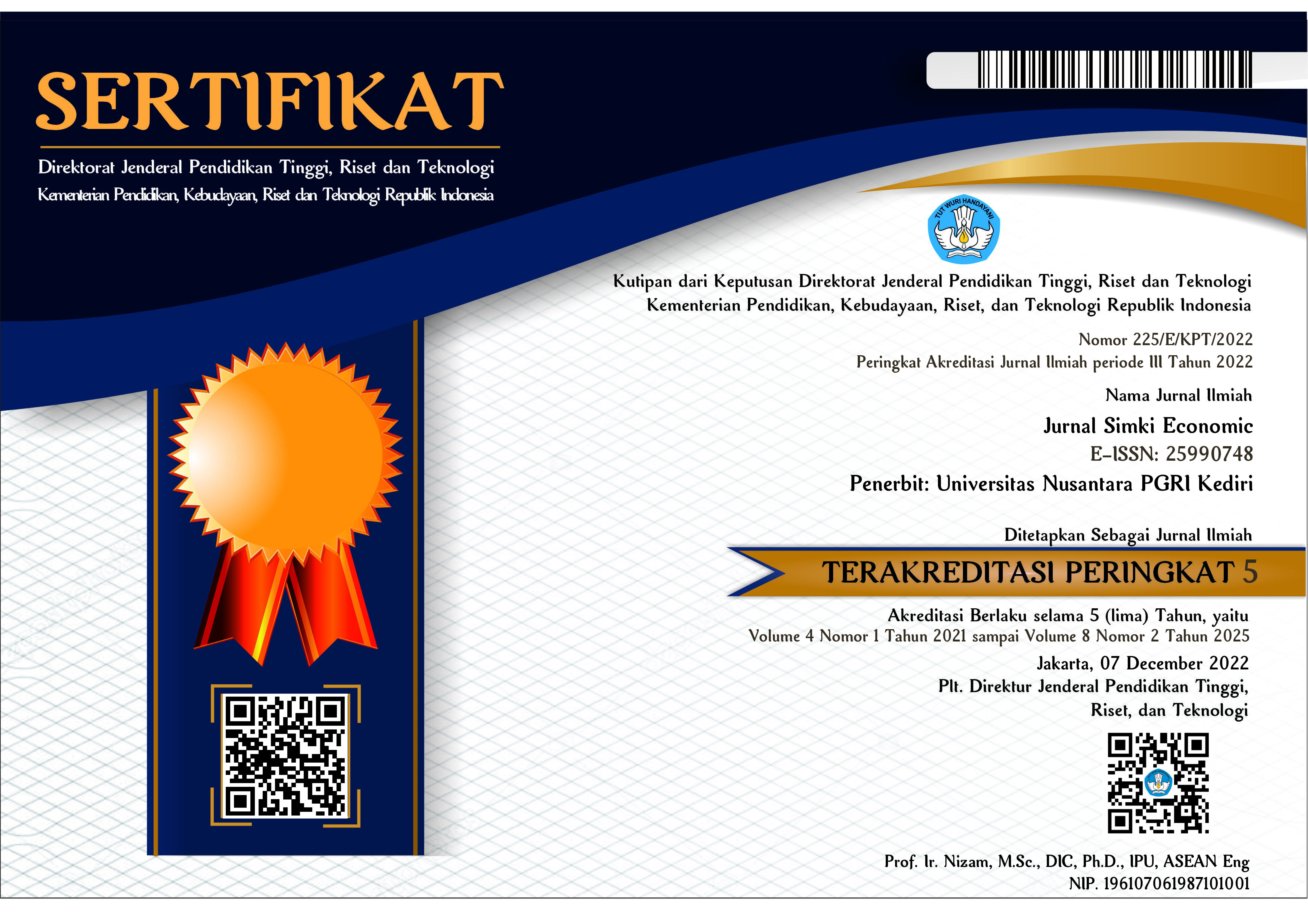Pengaruh Kemampuan, Motivasi dan Lingkungan Kerja terhadap Kinerja Pegawai Unit Pelaksana Teknis (UPT) PSDA di Pinrang, Sulawesi Selatan
 Abstract views: 687
,
Abstract views: 687
,
 PDF (Bahasa Indonesia) downloads: 698
PDF (Bahasa Indonesia) downloads: 698
Abstract
This study aims to investigate the important factors determining employee performance in Kab. Pinrang, South Sulawesi. Three independent contructs were identified from prior research studies, namely ability, motivation, and work environment. A quantitative approach was adapted to examine the causality effects between variables. A total of 54 participants were determined as a sample, where they were permanent employees of the PSDA Task Implementation Unit (UPT) office, in Kab. Pinang, South Sulawesi, Indonesia. Data collection was performed for 2 months by disseminating a paper questionnaire. The data obtained were then tested using multiple regression. The results proved that ability, motivation, and work environment had a positive and significant impact on employee performance at Pinrang, Sul-Sel. These findings are practically beneficial as an insight and knowledge for HRM stratgies and further research guidance as well.
Downloads
References
Asutay, M., Buana, G. K., & Avdukic, A. (2021). The Impact of Islamic Spirituality on Job Satisfaction and Organisational Commitment: Exploring Mediation and Moderation Impact. Journal of Business Ethics 2021, 1, 1–20. https://doi.org/10.1007/S10551-021-04940-Y
Baroudi, S., Tamim, R., & Hojeij, Z. (2022). A Quantitative Investigation of Intrinsic and Extrinsic Factors Influencing Teachers’ Job Satisfaction IN Lebanon. Leadership and Policy in Schools, 21(2), 127–146. https://doi.org/10.1080/15700763.2020.1734210
DeCenzo, D. A., Robbins, S. P., & Verhulst, S. L. (2015). Fundamentals of Human Resource Management (12th ed.). Wiley. Retrieved from https://www.wiley.com/en-us/Fundamentals+of+Human+Resource+Management%2C+12th+Edition-p-9781119158905
Dessler, G. (2017). Human resource management (15th ed.). Boston: Pearson Education, Inc.
Edward L. Deci, & Richard M. Ryan. (2004). Handbook of Self-determination Research. The University of Ronchester Press.
Fadhil, M., & Ashoer, M. (2020). Pengaruh Budaya Kerja, Kemampuan dan Komitmen terhadap Kinerja Dosen pada Perguruan Tinggi di Kabupaten Maros. JIMF (Jurnal Ilmiah Manajemen Forkamma), 3(2). https://doi.org/10.32493/FRKM.V3I2.4456
Fornes, S. L., Rocco, T. S., & Wollard, K. K. (2008). Workplace commitment: A conceptual model developed from integrative review of the research. Human Resource Development Review, 7(3), 339–357. https://doi.org/10.1177/1534484308318760
Locke, E. A. (1970). Job satisfaction and job performance: A theoretical analysis. Organizational Behavior and Human Performance, 5(5), 484–500. https://doi.org/10.1016/0030-5073(70)90036-X
Malik, A. (2018). Introduction. In Strategic Human Resource Management and Employment Relations (pp. 3–11). Springer. https://doi.org/10.1007/978-981-13-0399-9_1
Mangkunegara, A. P. (2017). Manajemen Sumber Daya Manusia Perusahaan. Bandung: Rosda.
Nurdiansyah, R., Mariam, S., Ameido, M. A., & Ramli, A. H. (2020). Work Motivation, Job Satisfaction and Employee Performance. Business and Entrepreneurial Review, 20(2), 153–162. https://doi.org/10.25105/BER.V20I2.8006
Pietrabissa, G., Rossi, A., Borrello, M., Manzoni, G. M., Mannarini, S., Castelnuovo, G., & Molinari, E. (2020). Development and Validation of a Self-Determination Theory-Based Measure of Motivation to Exercise and Diet in Children. Frontiers in Psychology, 11, 1299. https://doi.org/10.3389/fpsyg.2020.01299
Raziq, A., & Maulabakhsh, R. (2015a). Impact of Working Environment on Job Satisfaction. Procedia Economics and Finance, 23, 717–725. https://doi.org/10.1016/s2212-5671(15)00524-9
Raziq, A., & Maulabakhsh, R. (2015b). Impact of Working Environment on Job Satisfaction. Procedia Economics and Finance, 23, 717–725. https://doi.org/10.1016/S2212-5671(15)00524-9
Sansone, C., & Harackiewicz, J. M. (2000). Intrinsic and Extrinsic Motivation. Intrinsic and Extrinsic Motivation. Elsevier. https://doi.org/10.1016/B978-0-12-619070-0.X5020-X
Sekaran, U., & Bougie, R. (2017). Metode Penelitian untuk Bisnis (Edisi 1). Jakarta: Salemba Empat.
Sreejesh, S., Mohapatra, S., & Anusree, M. R. (2014). Business Research Methods: An Applied Orientation. Springer International Publishing. https://doi.org/10.1007/978-3-319-00539-3
Taylor, E. Z., & Curtis, M. B. (2010). An Examination of the layers of Workplace Influence in Ethical Judgements: Whistleblowing Likelihood and Perseverance in Public Accounting. Journal of Business Ethics, 93(4), 21–37. https://doi.org/10.1007/s10551-009-0179-9
Vallerand, R. J., Koestner, R., & Pelletier, L. G. (2008). Reflections on self-determination theory. Canadian Psychology, 49(3), 257–262. https://doi.org/10.1037/A0012804
Vischer, J. C. (2007). The effects of the physical environment on job performance: Towards a theoretical model of workspace stress. Stress and Health, 23(3), 175–184. https://doi.org/10.1002/SMI.1134
Yang, C. L., & Hwang, M. (2014). Personality traits and simultaneous reciprocal influences between job performance and job satisfaction. Chinese Management Studies, 8(1), 6–26. https://doi.org/10.1108/CMS-09-2011-0079
Copyright (c) 2023 Nurul Pratiwi, Baso Amang, Zaenal Arifin Sahabuddin

This work is licensed under a Creative Commons Attribution 4.0 International License.














